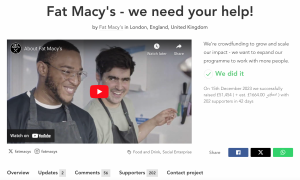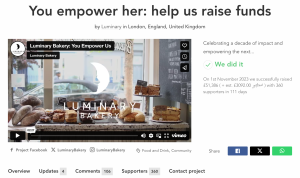Crowdfunding for social enterprise, the future of match funding and how to get it!
The Crowdfunding Coach
My name is Bertie Herrtage and after 5 years as the Senior Coach at the fundraising platform Crowdfunder UK, I started my own business ‘The Crowdfunding Coach’, promoting crowdfunding education within the Third Sector. I specialise in donation and rewards based crowdfunding for social enterprises and I’m a strong advocate for the use and development of ‘match funding’ opportunities to plug the financial gap that these organisations are facing.
Social enterprises perform well when crowdfunding
Back in 2018, I started to see that social enterprise campaigns performed particularly well when crowdfunding. This was because of what we call a ‘dual motivation’ to support them. Their service to society attracted donations and their capacity for trade allows them to offer rewards, which are products or services in return for a financial contribution. The use of rewards in the crowdfunding context acts as a further incentive to give, encouraging supporters to pledge more money, increasing the average spent on a donation-only campaign from £20 to £50.
I believe that crowdfunding should be part of the financial life cycle of every social enterprise because the process is an accelerator programme in itself. Beyond raising the money they need it allows these organisations to benefit from the inherent; story telling, marketing, audience development, networking, product testing and content creation involved. With less than half of VCSE organisations rating their digital skills as “good” (Gov, 2022), crowdfunding serves us as an opportunity to correct that.
Social Investment
It’s been my experience that social enterprises are being steered towards social investment but with 42% of social enterprises under 5 years old (SE UK, 2019), they often do not have the necessary revenue to take on debt. Furthermore, with the median amount of repayable finance sought at £50,000 (Good Finance, 2023) these numbers are not appetising for banks to lend, because the due diligence and administration alone rubs out the profit in the deal. In an economic climate where the average grant awarded is £12,000 (dsc, 2023) and ‘almost half of social enterprises report the amount of suitable finance available to their organisations is insufficient’ (SE UK, 2023), we know that we need to be more creative about where this funding is going to come from.
Crowdfunding is a technology which allows for a more collaborative and transparent approach to finance. Instead of a bid for a grant or investment done behind closed doors, it’s done out in the open on a digital stage.
Collaborative finance
Match funding is based on the belief that there is no one financial solution to the funding of these organisations. Instead, the answer is to enable a more collaborative approach to finance which involves; government, local authorities, corporations, trusts and the public. The premise being that the more funders we can encourage to host match funding opportunities through crowdfunding, the less pressure the organisations put on their own networks. This is especially relevant for smaller organisations in less affluent areas and in the context of the cost of living crisis that we’re in.
What this will take is for the traditional grant making organisations to become more comfortable trialling the distribution of their finance in new and innovative ways. By even making small pots of finance available through this method, they will be quickly able to see what the demand is, how the application process suits them and most importantly, witness the benefits of public participation and the impact of collaborating with other funds on the financing of these organisations.
The technology is already here and crowdfunding platforms like Crowdfunder UK have the potential to become one-stop-shops for organisations in need of finance. By making multiple funds available under one roof, the process of finding appropriate finance becomes much easier to navigate for these organisations and therefore much more accessible.
Here’s an example of how match funding works
 A social enterprise based in London which is tackling the impact of our housing crisis by providing support for those at risk of homelessness. Fat Macy’s allows those they work with to save for a deposit and develop skills through a culinary and hospitality training programme, thereby helping them into work.
A social enterprise based in London which is tackling the impact of our housing crisis by providing support for those at risk of homelessness. Fat Macy’s allows those they work with to save for a deposit and develop skills through a culinary and hospitality training programme, thereby helping them into work.
https://www.crowdfunder.co.uk/p/fat-macys-big-supper-club
After closing last week, Fat Macy’s has successfully raised £56,454 from 203 supporters of a £50,000 target (the median amount of repayable finance sought by a social enterprise).
The current breakdown of what they have raised
Match funding: £34,155
Access’s ‘The Cost of Living Resilience Fund’: £17,350
Aviva Community Fund: £10,225
Aviva Employee Giving: £1,520
Sovereign Network Group: £5,000
Solus Employee Giving: £60
The public: £22,299
 My next example is a social enterprise which uses baking as a tool to take vulnerable women on a journey to employability and entrepreneurship, equipping them with transferable skills for the working world.
My next example is a social enterprise which uses baking as a tool to take vulnerable women on a journey to employability and entrepreneurship, equipping them with transferable skills for the working world.
In November this year, Luminary Bakery raised £51,386 from 360 supporters and if you have a few minutes to spare, please do watch their crowdfunding video, it is very inspiring!
https://www.crowdfunder.co.uk/p/youempowerher
This is the breakdown of what they raised through crowdfunding
Match funding: £31,528
British Airways ‘The Better World Community Fund’: £15,000
Avios donations: £516
British Airways Executive Club: £516
Aviva Community Fund: £13,426
Aviva Employee Giving: £2,070
The public: £19,858
As we can see, £50,000 is an achievable target for social enterprises to reach through crowdfunding, provided that there are the match funders there to support them.
The process is simple, create a project on Crowdfunder.co.uk and by adding information about where you are based and who you benefit, you’ll quickly see which match funding opportunities are available to you. The secret is to submit your applications before launching your campaign, thereby ensuring you know exactly what the shape of the opportunity is before you start. The good news? Crowdfunder UK charges 0% fees for social enterprises.
At The Crowdfunding Coach, I offer a free 1-2-1 consultation for social enterprises. If your organisation is based in the UK and you’re interested to see how crowdfunding might be of use to you, please reach out via one of the channels below.
E: bertie@thecrowdfundingcoach.org
Instagram: the_crowdfundingcoach
LinkedIn: bertie-herrtage-11987663






Leave a Reply
Want to join the discussion?Feel free to contribute!